Rarely do we consider the future resale value of our purchases while still riding the wave of excitement from a good deal. However, once that initial thrill fades, reality sets in and we begin to wonder how much money we can recoup if we choose to sell the valuable item we recently acquired.
Diamonds are considered luxury goods, making it crucial to ponder this question in advance: What can we expect to receive if we are compelled to sell them in the future? Unfortunately, the disappointing truth is that the resale value of diamonds tends to be relatively low.
Consequently, today we will delve into the following inquiry: Why is the resale value of diamonds so meager? Is it justifiable to view diamond purchases as sound investments, or are you likely to incur financial losses?
By continuing to read, you will discover the approximate amount you can anticipate receiving if your soon-to-be bride happens to dislike the stunning diamond engagement ring you purchased for her. In case you are unaware, as soon as you finalize the transaction and step out of the store, your diamond’s worth will diminish to only half of the price you initially paid.
Perhaps it is wiser to allow your fiancée to select her own diamond ring, ensuring that you won’t have to go through the process of reselling it and starting anew. Why concern yourself with financial worries when you can assess the risks beforehand? We understand that this may be a perplexing topic, so stay with us as we explain everything you need to know about the resale value of diamonds.
DESIGN YOUR OWN ENGAGEMENT RING: START WITH A SETTING OR START WITH A DIAMOND. IT’S REALLY UP TO YOU!
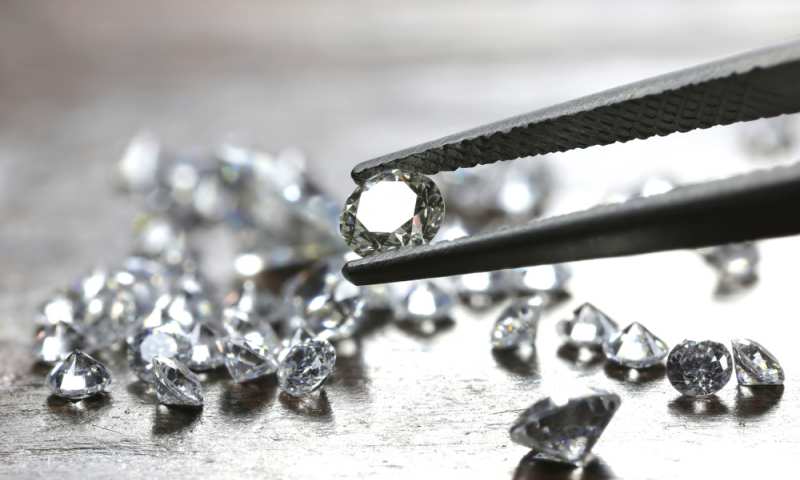
First Things First: Why is Diamond Resale Value So Low?
As we previously cautioned, the value of a diamond is typically twice as high when it is on display at a jeweler’s store compared to after you make the purchase. This rather surprising fact can be attributed to jewelers buying their diamond inventory in bulk at wholesale rates.
When a jeweler acquires a diamond from the manufacturer, it has already undergone the necessary evaluations and certifications by the Gemological Institute of America (GIA) regarding its cut, clarity, carat weight, and color. The wholesalers factor in all the expenses incurred in the creation and refinement of the diamond to determine their wholesale price. On the other hand, retail jewelers often take the very same diamond and double its price, which becomes the final value you pay at the store. The question arises: Why is this pricing practice in place, and is it justified?
This pricing strategy has become widely accepted, resulting in substantial mark-ups for retail items, with diamonds being particularly affected. It is the primary reason for the relatively low resale value of diamonds.
Diamonds tend to have a slower turnover rate, and to safeguard their business against slow-moving inventory, a jeweler may purchase a diamond for $1,000 from a wholesaler and then mark up its price to $2,000. This significant mark-up serves as a necessary measure for retail jewelers to cover the various costs associated with running their business, such as expenses for utilities and rent. In the end, they are left with only a minimal profit.
Related Read: Diamond Price List: How Much Is A 0.1 To 40 Carat Diamond Worth?
Do Diamonds Have Resale Value?
Yes, diamonds do have a resale value. However, no jeweler will purchase a used diamond ring from you at the same price you paid, not even the jeweler from whom you initially made the purchase. The reason is simple: They can all acquire a brand new diamond directly from the manufacturer at a much lower cost.
Related Read: Do Raw Uncut Diamonds Have Resale Value?
Appraisal Value vs. Resale Value
Jewelers often provide buyers with an appraisal value for their diamond ring. This value does not necessarily mean that you obtained the diamond at a better price, but it does offer some protection against excessive charges if you choose to replace the diamond in the future. However, keep in mind that a higher appraisal value also results in a higher insurance premium for your diamond.
The resale value of a diamond is influenced by current market trends and depends on the mark-up of your specific diamond, as well as recent fluctuations in the value of diamonds. Generally, you can expect the resale value of your diamond to fall within the range of 25% to 50% of the original price. If your diamond is insured, a certain percentage will be deducted to cover that as well.
Stay tuned for a more detailed discussion on determining the resale value of diamonds as we delve deeper into the topic.
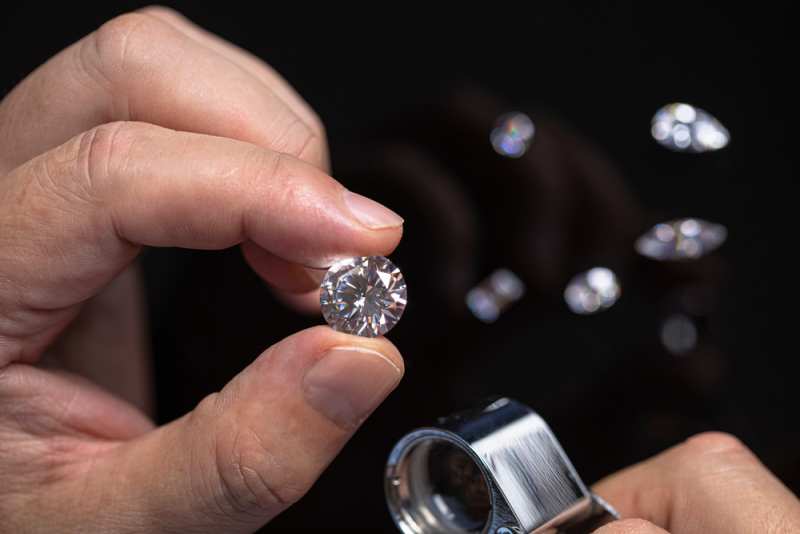
How Is The Resale Value Of A Diamond Determined?
To avoid falling victim to deception, it is crucial to consider several factors before selling your diamond. Fraudulent incidents occur more frequently than we would like to admit, which is why both sellers and buyers must adjust their expectations and have a comprehensive understanding of the key selling points of diamonds.
Having in-depth knowledge about the characteristics and qualities of your diamond enables you to make an informed decision when selecting a buyer. It is essential to possess a grading certificate issued by the Gemological Institute of America (GIA) when buying or selling diamonds. This certificate contains vital information about your diamond’s attributes.
If you do not possess a GIA certificate, you may need to incur additional costs to have your diamond certified by GIA or another reputable grading laboratory. The certificate provided by a respected grading lab is the most crucial document you should have when engaging in a resale transaction.
What Information Does the GIA Certificate Provide About Your Diamond?
- Clarity
The GIA employs a specialized grading system to evaluate the clarity of your diamond. Clarity refers to the visibility of inclusions and imperfections within the diamond crystal.
- Color
Color is another highly significant factor that influences the value and quality of a diamond. Diamonds with a slight tinge of brown or yellow are considered lower in quality and are categorized and priced accordingly. In essence, the less noticeable color in your diamond, the higher its value.
- Diamond Cut
The cut of a diamond greatly impacts its brilliance and reflectivity. Therefore, a better cut corresponds to a higher value. A diamond’s cut is determined by its shape and the number and arrangement of its facets. Round-cut diamonds have the most stringent guidelines.
- Carat Weight
Carat weight refers to the actual weight of the diamond crystal, with one carat equivalent to 0.2 grams. Consequently, larger diamonds have a higher carat value. Additionally, diamonds with more carats command higher prices.
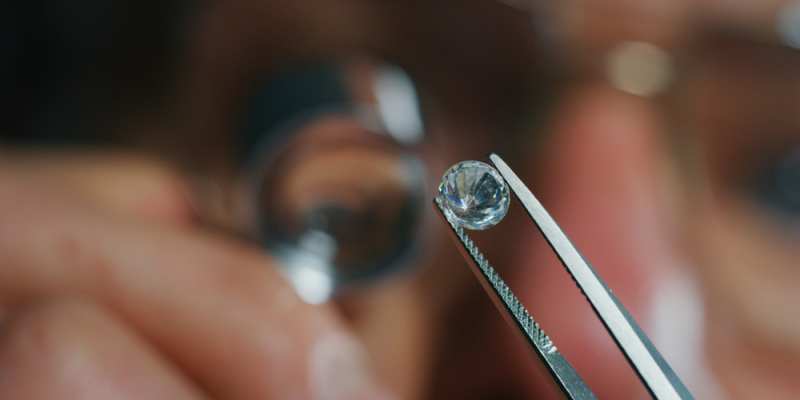
Can You Get More if You Resell Your Diamond to a Pawnshop?
If you opt to sell your diamond at a pawnshop, it is reasonable to anticipate receiving approximately 30% to 60% of its worth. However, it is important to acknowledge that pawnshops often offer the lowest value possible, as they operate with minimal selling costs and need to generate profit to sustain their business.
Therefore, selling your diamond at a pawnshop should be considered as a last resort. In doing so, you should be prepared to receive only a fraction of the amount you initially invested in the diamond.
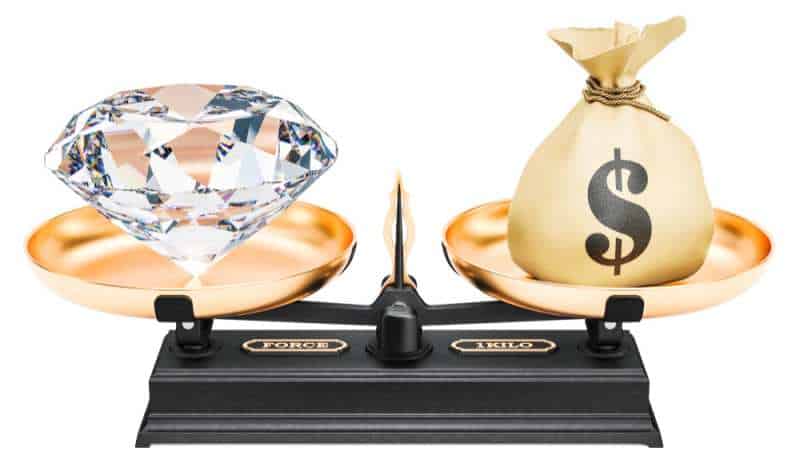
Where Can You Get The Most Money For Your Diamond?
Your optimal choice is to seek out online brokers when it comes to selling your diamond. These brokers offer exceptional convenience, attentiveness, and efficiency. Most importantly, they are dedicated to assisting you throughout the diamond resale process and finding the best buyer for your needs.
Once again, it is crucial to have a GIA certificate (or an equivalent grading certificate). This certificate must be provided to the brokers so they can accurately assess the quality of your diamond. Additionally, if you prefer to conduct the entire transaction online, you will need to provide them with pictures of the diamond. Alternatively, you can arrange in-person meetings to discuss all the details of the resale.
Online brokers possess connections and access to a vast network within the diamond market, which can potentially secure you up to 39% less than the original value of your diamond. However, the actual resale value depends on the specific quality and characteristics of your diamond. It is important to maintain realistic expectations to ensure a successful sale and the satisfaction of all parties involved.
What Are Your Other Options?
There are a couple of alternative options for selling your diamond. Apart from online diamond brokers, you can also consider visiting physical jewelry stores that provide quotes. Our recommendation is to explore as many potential buyers as possible to obtain multiple quotes. This tactic increases your chances of obtaining a favorable resale value.
It is possible that some jewelers may decline to provide a quote for your diamond. This could be because diamonds are slow-moving assets for them, or they already have an adequate inventory. Do not be disheartened by such responses. They simply prefer to pass on your diamond rather than provide a quote that could potentially harm their reputation.
Another avenue to explore is selling your diamond through online platforms like eBay. However, it can be challenging to find a serious buyer who is willing to pay a reasonable rate for your diamond. Furthermore, engaging in the search for potential buyers on such platforms exposes you to various risks and potential scams.
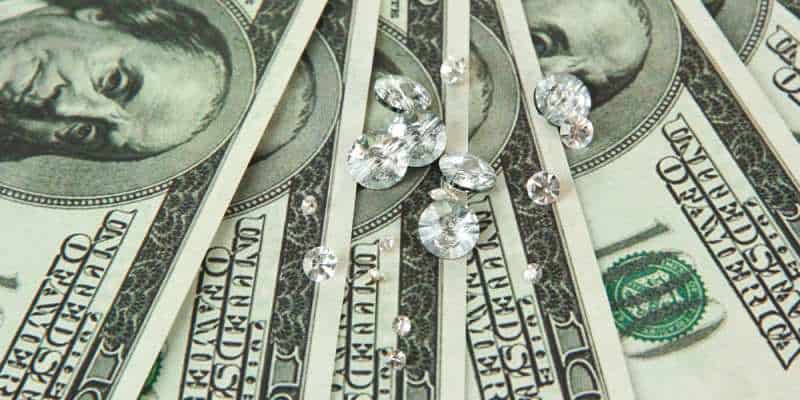
Final Tips
Now equipped with the correct information, selling your diamond to the right buyer should be a straightforward process. As long as you maintain realistic expectations, you can be satisfied with the final payout you receive.
However, it’s important to acknowledge the inevitable truth that you will sell your precious diamond for less than its original purchase price. If you can come to terms with this outcome, you can still find contentment.
Remember the advice we’ve provided:
- Avoid pawn shops at all costs, as their low prices translate to low quotes. Only those in desperate need of immediate cash should consider selling such a valuable item to a pawn shop.
- Local jewelers are not a favorable option either, even though their quotes may be better than those from pawn shops. They can acquire new diamonds at wholesale prices, making it unlikely for them to offer a reasonable quote.
- The best option is to sell your diamond online through reputable jewelry brokers. Ensure you choose a trustworthy company, and you can expect a fair offer. Regardless, this option will likely yield more money than any other diamond resale avenue.
- Lastly, consider the timing of your sale. When diamond prices decline, so does demand. A decrease in demand indicates a lack of interest from potential buyers, potentially driving prices even lower. It may not be an ideal time to sell your diamond under these circumstances.
If possible, hold onto your precious diamond until conditions improve, even if that means passing it down to the next generation. Then, your heirs can try their luck and potentially earn a much higher value. If not, at least they will have a cherished memento of you.


